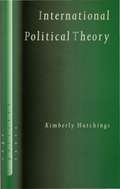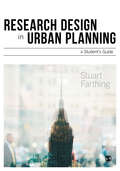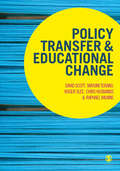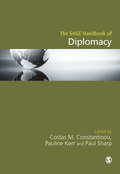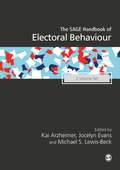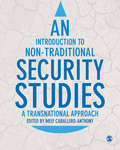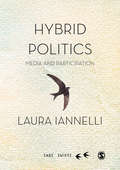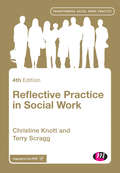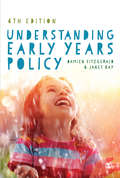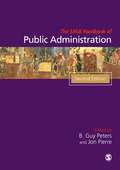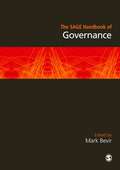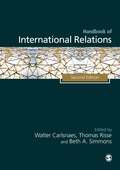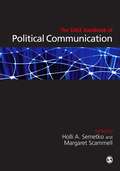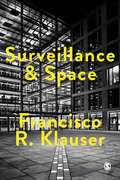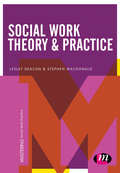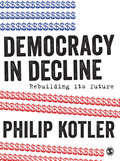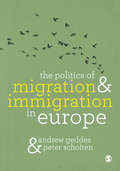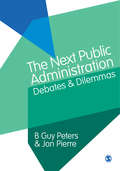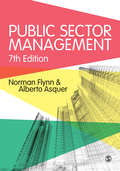- Table View
- List View
International Political Theory: Rethinking Ethics in a Global Era (SAGE Politics Texts series #5)
by Kimberly Hutchings`A lucid, comprehensive analysis of normative approaches to international relations, and an original contribution to critical theory' - Andrew Linklater, University of Keele `Hutchings combines a valuable account of the current state of the art with a lucid expositon of her own, highly distinctive, position. This will be required reading for students in international political theory, and indeed anyone interested in normative issues in international relations' - Chris Brown, London School of Economics and Political Science Providing an invaluable overview of the competing schools of thought in traditional and contemporary international theory, this book seeks to path the way forward for new ways of thinking about international political morality. First, the role and place of normative theory in the study of international politics is explained before a discussion of mainstream approaches within international relations and applied ethics. Here the student is introduced to the central debates between realists and idealists, and cosmopolitans and communitarians. Second, the conceptual challenges of contemporary approaches in critical theory, postmodernism and feminism are outlined and then used as a platform to develop the author's own Hegelian-Foucauldian approach for doing normative international theory. Third, the insights drawn from each approach are applied to the study of two key topics in contemporary theoretical debate: the right to self-determination, and the idea of cosmopolitan democracy, and conclusions drawn for transcending the theoretical deadlock in international relations. Accessibly written and wide-ranging, this text will quickly become essential reading for all students and academics of politics and international relations seeking a deeper understanding of the underlying tensions and future potential of international theory today.
Research Design in Urban Planning: A Student's Guide
by Stuart Farthing"This excellent book fills a significant gap in the literature supporting planning education by providing clear, succinct advice on the design and implementation of small-scale student research projects." - Chris Couch, Professor of Geography and Planning, University of Liverpool "A perfect text for supervisors to give students so that they plan their research projects carefully rather than leap headlong into data collection." - Jean Hillier, Emeritus Professor of Sustainability and Urban Planning, RMIT University, Melbourne "Highly recommended... Ranging across topics such as planning a research programme and data management and the handling of ethical issues, the book will be very helpful to those embarking on a thesis or dissertation in the field." - Peter Fidler, President of the University of Sunderland Research Design in Urban Planning: A Student's Guide is a brilliantly accessible guide to designing research for that all-important dissertation. Aimed at both undergraduate and postgraduate levels, this text will: · discuss research design, outlining the stages of the research process in clear detail and the key decisions which need to be taken at each stage · explain to students how to re-interpret policy issues as researchable questions, appropriate for investigation · look in detail at how researchers make their choice of methods, helping students to justify their own decisions · reveal the ethical dimension to such decisions in the context of a growing requirement for the ethical approval of student projects · review the issues for comparative studies - important not least because of student involvement in Erasmus programs and AESOP workshops Packed with case studies, exercises, illustrations and summaries, Research Design in Urban Planning is an invaluable resource for students undertaking their first substantial, individual investigations.
Scott, Terano, Slee, Husbands, Wilkins. Policy Transfer and Educational Change.
by David Scott Roger Slee Mayumi Terano Chris Husbands Raphael WilkinsImproving education through policy learning is an important notion for countries in need of educational reform. However, identifying a successful set of practices and transferring them from one national setting to another is a complex exercise. Drawing from their extensive experience, the authors explore a single case study of policy transfer in India, demonstrating how and under what conditions educational reforms can be put into practice successfully and sustainably. Coverage includes: . Policy Learning . Inclusive Practices . School Autonomy and School Leadership . India and its system of education This book offers a unique, international perspective on educational reform and is a useful resource for teachers, policy makers and postgraduate level students. "
The SAGE Handbook of Diplomacy
by Dr Pauline Kerr Professor Costas M. Constantinou Professor Paul SharpThe SAGE Handbook of Diplomacy provides a major thematic overview of Diplomacy and its study that is theoretically and historically informed and in sync with the current and future needs of diplomatic practice . Original contributions from a brilliant team of global experts are organised into four thematic sections: Section One: Diplomatic Concepts & Theories Section Two: Diplomatic Institutions Section Three: Diplomatic Relations Section Four: Types of Diplomatic Engagement
The SAGE Handbook of Diplomacy
by Professor Costas M. Constantinou Dr Pauline Kerr Professor Paul SharpThe SAGE Handbook of Diplomacy provides a major thematic overview of Diplomacy and its study that is theoretically and historically informed and in sync with the current and future needs of diplomatic practice . Original contributions from a brilliant team of global experts are organised into four thematic sections: Section One: Diplomatic Concepts & Theories Section Two: Diplomatic Institutions Section Three: Diplomatic Relations Section Four: Types of Diplomatic Engagement
The SAGE Handbook of Electoral Behaviour
by Kai Arzheimer Michael S. Lewis-Beck Professor Jocelyn EvansThe study of voting behaviour remains a vibrant sub-discipline of political science. The Handbook of Electoral Behaviour is an authoritative and wide ranging survey of this dynamic field, drawing together a team of the world's leading scholars to provide a state-of-the-art review that sets the agenda for future study. Taking an interdisciplinary approach and focusing on a range of countries, the handbook is composed of eight parts. The first five cover the principal theoretical paradigms, establishing the state of the art in their conceptualisation and application, and followed by chapters on their specific challenges and innovative applications in contemporary voting studies. The remaining three parts explore elements of the voting process to understand their different effects on vote outcomes. The SAGE Handbook of Electoral Behaviour is an essential benchmark publication for advanced students, researchers and practitioners in the fields of politics, sociology, psychology and research methods.
The SAGE Handbook of Electoral Behaviour
by Kai Arzheimer Michael S. Lewis-Beck Professor Jocelyn EvansThe study of voting behaviour remains a vibrant sub-discipline of political science. The Handbook of Electoral Behaviour is an authoritative and wide ranging survey of this dynamic field, drawing together a team of the world's leading scholars to provide a state-of-the-art review that sets the agenda for future study. Taking an interdisciplinary approach and focusing on a range of countries, the handbook is composed of eight parts. The first five cover the principal theoretical paradigms, establishing the state of the art in their conceptualisation and application, and followed by chapters on their specific challenges and innovative applications in contemporary voting studies. The remaining three parts explore elements of the voting process to understand their different effects on vote outcomes. The SAGE Handbook of Electoral Behaviour is an essential benchmark publication for advanced students, researchers and practitioners in the fields of politics, sociology, psychology and research methods.
An Introduction to Non-Traditional Security Studies: A Transnational Approach
by Mely Caballero-AnthonyWith the end of the Cold War, threats to national security have become increasingly non-military in nature. Issues such as climate change, resource scarcity, infectious diseases, natural disasters, irregular migration, drug trafficking, information security and transnational crime have come to the forefront. This book provides a comprehensive introduction to Non-Traditional Security concepts. It does so by: Covering contemporary security issues in depth Bringing together chapters written by experts in each area Guiding you towards additional material for your essays and exams through further reading lists Giving detailed explanations of key concepts Testing your understanding through end-of-chapter questions Edited by a leading figure in the field, this is an authoritative guide to the key concepts that you'll encounter throughout your non-traditional, and environmental, security studies courses.
An Introduction to Non-Traditional Security Studies: A Transnational Approach
by Mely Caballero-AnthonyWith the end of the Cold War, threats to national security have become increasingly non-military in nature. Issues such as climate change, resource scarcity, infectious diseases, natural disasters, irregular migration, drug trafficking, information security and transnational crime have come to the forefront. This book provides a comprehensive introduction to Non-Traditional Security concepts. It does so by: Covering contemporary security issues in depth Bringing together chapters written by experts in each area Guiding you towards additional material for your essays and exams through further reading lists Giving detailed explanations of key concepts Testing your understanding through end-of-chapter questions Edited by a leading figure in the field, this is an authoritative guide to the key concepts that you'll encounter throughout your non-traditional, and environmental, security studies courses.
Walker. Exaggerated Claims: The ESRC, 50 Years On (SAGE Swifts)
by David Walker"David Walker s analysis is incisive and hard hitting. Anyone who believes in the power of social science to inform better policy making should take his criticisms seriously. " - Sue Duncan, Former Chief Government Social Researcher and Head of the Government Social Research Service "David Walker has written an unofficial summary of ESRC's achievements and struggles. He brings to the task long experience of the organisation and of the key players, a great familiarity with the literature and a sceptical nature. The result is stimulating, instructive, contentious and sometimes even infuriating. " - David Rhind, Chair of the Nuffield Foundation What is the role of the state in distributing research money? How do 'arm's-length' funding agencies relate to public policy and business? This original study looks at the main social science funding agency in the UK, which was established 50 years ago. It examines how funding decisions are related to power. The 'critical' and policy' aspects of successful research bids are discussed. Walker asks the tricky question, why has social science research not achieved a more salient role in state policy formation and management strategy: is the funding agency responsible? Insightful, engrossing and highly original, the book will be required reading for anyone who has written or will write a Social Science research bid and, more widely, for students of power, knowledge and culture. "
Exaggerated Claims?: The ESRC, 50 Years On (SAGE Swifts)
by David Walker"David Walker’s analysis is incisive and hard hitting. Anyone who believes in the power of social science to inform better policy making should take his criticisms seriously." - Sue Duncan, Former Chief Government Social Researcher and Head of the Government Social Research Service "David Walker has written an unofficial summary of ESRC's achievements and struggles. He brings to the task long experience of the organisation and of the key players, a great familiarity with the literature and a sceptical nature. The result is stimulating, instructive, contentious and sometimes even infuriating." - David Rhind, Chair of the Nuffield Foundation What is the role of the state in distributing research money? How do 'arm's-length' funding agencies relate to public policy and business? This original study looks at the main social science funding agency in the UK, which was established 50 years ago. It examines how funding decisions are related to power. The 'critical' and ‘policy' aspects of successful research bids are discussed. Walker asks the tricky question, why has social science research not achieved a more salient role in state policy formation and management strategy: is the funding agency responsible? Insightful, engrossing and highly original, the book will be required reading for anyone who has written or will write a Social Science research bid and, more widely, for students of power, knowledge and culture.
Reflective Practice in Social Work (Transforming Social Work Practice Series)
by Terry Scragg Christine KnottReflective practice is at the heart of becoming a competent and confident social worker. It s both a key element of learning and development on social work courses and an important aspect of social work practice. This accessible and introductory text explores a range of approaches to reflective practice that aims to help students become more confident in answering key questions, including 'what is reflective practice?', how do I develop as a reflective practitioner?, how do I maintain reflective practice in key contexts? . There are sections on writing reflective journals, communicating well with service users and carers and reflective practice while on placements. "
Understanding Early Years Policy
by Damien Fitzgerald Janet KayNow in its fourth edition, this bestselling textbook continues to provide fully updated coverage of all the latest developments in early years policy such as the revised Early Years Foundation Stage (EYFS), SEND Code of Practice 0-25 years and the Children and Families Act 2014. Exploring how policy is made, implemented, analysed and developed over time this book presents a complete overview of early years policy and an evaluation of its ongoing impact on practice. This Fourth Edition has been significantly updated to include: Full coverage of the 2010-2015 UK Coalition Government. A comprehensive timeline of Early Years policy Guidance on how to research policy for yourself More international case studies, now including the US and Scandinavia. New material on how to manage policy changes as a practitioner An expandedfocus of the devolved countries within the UK This text is an essential read for early years students at all levels, and early years practitioners.
Understanding Early Years Policy
by Damien Fitzgerald Janet KayPreviously known as Baldock: Understanding Early Years Policy is in its Fourth Edition. This best-selling textbook continues to provide fully updated coverage of all the latest developments in early years policy such as the revised Early Years Foundation Stage (EYFS), SEND Code of Practice 0-25 years and the Children and Families Act 2014. Exploring how policy is made, implemented, analysed and developed over time this book presents a complete overview of early years policy and an evaluation of its ongoing impact on practice. This Fourth Edition has been significantly updated to include: Full coverage of the 2010-2015 UK Coalition Government. A comprehensive timeline of Early Years policy Guidance on how to research policy for yourself More international case studies, now including the US and Scandinavia. New material on how to manage policy changes as a practitioner An expandedfocus of the devolved countries within the UK This text is an essential read for early years students at all levels, and early years practitioners.
The SAGE Handbook of Public Administration
by B. Guy Peters Jon PierreThe original Handbook of Public Administration was a landmark publication, the first to provide a comprehensive and authoritative survey of the discipline. The eagerly-awaited new edition of this seminal international handbook continues to provide a complete review and guide to past and present knowledge in this essential field of inquiry. Assembling an outstanding team of scholars from around the world, the second edition explores the current state-of-the-art in academic thinking and the current structures and processes for the administration of public policy. The second edition has been fully revised and updated, with new chapters that reflect emerging issues and changes within the public sector: - Identifying the Antecedents in Public Performance - Bureaucratic Politics - Strategy Structure and Policy Dynamics - Comparative Administrative Reform - Administrative Ethics - Accountability through Market and Social Instruments - Federalism and intergovernmental coordination. A dominant theme throughout the handbook is a critical reflection on the utility of scholarly theory and the extent to which government practices inform the development of this theory. To this end it serves as an essential guide for both the practice of public administration today and its on-going development as an academic discipline. The SAGE Handbook of Public Administration remains indispensable to the teaching, study and practice of public administration for students, academics and professionals everywhere.
The SAGE Handbook of Governance
by Mark BevirThe study of governance has risen to prominence as a way of describing and explaining changes in our world. The SAGE Handbook of Governance presents an authoritative and innovative overview of this fascinating field, with particular emphasis on the significant new and emerging theoretical issues and policy innovations. The Handbook is divided into three parts. Part one explores the major theories influencing current thinking and shaping future research in the field of governance. Part two deals specifically with changing practices and policy innovations, including the changing role of the state, transnational and global governance, markets and networks, public management, and budgeting and finance. Part three explores the dilemmas of managing governance, including attempts to rethink democracy and citizenship as well as specific policy issues such as capacity building, regulation, and sustainable development. This volume is an excellent resource for advanced students and researchers in political science, economics, geography, sociology, and public administration. Mark Bevir is a Professor of Political Science at the University of California, Berkeley.
Handbook of International Relations (Oxford Handbooks In Politics And International Relations Ser.)
by Walter Carlsnaes Professor Beth A Simmons Professor Thomas RisseThe original Handbook of International Relations was the first authoritative and comprehensive survey of the field of international relations. In this eagerly-awaited new edition, the Editors have once again drawn together a team of the world's leading scholars of international relations to provide a state-of-the-art review and indispensable guide to the field, ensuring its position as the pre-eminent volume of its kind. The Second Edition has been expanded to 33 chapters and fully revised, with new chapters on the following contemporary topics: - Normative Theory in IR - Critical Theories and Poststructuralism - Efforts at Theoretical Synthesis in IR: Possibilities and Limits - International Law and International Relations - Transnational Diffusion: Norms, Ideas and Policies - Comparative Regionalism - Nationalism and Ethnicity - Geopolitics in the 21st Century - Terrorism and International Relations - Religion and International Politics - International Migration A truly international undertaking, this Handbook reviews the many historical, philosophical, analytical and normative roots to the discipline and covers the key contemporary topics of research and debate today. The Handbook of International Relations remains an essential benchmark publication for all advanced undergraduates, graduate students and academics in politics and international relations.
The SAGE Handbook of Political Communication
by Dr Margaret Scammell Holli A SemetkoThis authoritative and comprehensive survey of political communication draws together a team of the world's leading scholars to provide a state-of-the-art review that sets the agenda for future study. It is divided into five sections: Part One: explores the macro-level influences on political communication such as the media industry, new media, technology, and political systems Part Two: takes a grassroots perspective of the influences of social networks - real and online - on political communication Part Three: discusses methodological advances in political communication research Part Four: focuses on power and how it is conceptualized in political communication Part Five: provides an international, regional, and comparative understanding of political communication in its various contexts The SAGE Handbook of Political Communication is an essential benchmark publication for advanced students, researchers and practitioners in the fields of politics, media and communication, sociology and research methods.
Surveillance and Space (Society and Space)
by Francisco KlauserThe digital age is also a surveillance age. Today, computerized systems protect and manage our everyday life; the increasing number of surveillance cameras in public places, the computerized loyalty systems of the retail sector, geo-localized smart-phone applications, or smart traffic and navigation systems. Surveillance is nothing fundamentally new, and yet more and more questions are being asked: Who monitors whom, and how and why? How do surveillance techniques affect socio-spatial practices and relationships? How do they shape the fabrics of our cities, our mobilities, the spaces of the everyday? And what are the implications in terms of border control and the exercise of political power? Surveillance and Space responds to these modern questions by exploring the complex and varied interactions between surveillance and space. In doing so, the book also advances a programmatic reflection on the very possibility of a ‘political geography of surveillance’.
Social Work Theory and Practice (Mastering Social Work Practice)
by Lesley Deacon Stephen J MacdonaldUnderstanding how theory informs social work practice is an area that students can often find challenging. This book will help students understand how theory impacts and informs social work practice across a range of contexts and with different service user groups. It starts off by briefly setting the context, introducing students to the importance of social work theory and its development over the years, before moving on to look at different types of theory across 17 tightly structured chapters. These cover a range of psychological theories, sociological theories, ethics and moral philosophies, political theories and ideologies, and organisational theories.
Democracy in Decline: Rebuilding its Future
by Philip KotlerDemocracy in Decline is an examination by the 'father of modern marketing' into how a long cherished product (democracy) is failing the needs of its consumers (citizens). Philip Kotler identifies 14 shortcomings of today's democracy and confronts this gloomy outlook with some potential solutions and a positive message; that a brighter future awaits if we can come together and save democracy from its decline. Encouraging readers to join the conversation, exercise their free speech and get on top of the issues that affect their lives regardless of nationality or political persuasion. Suitable for students across a broad range of courses including Political Science, Politics, Political Marketing and Critical Management/Sociology. An accompanying website (www.democracyindecline.com) invites those interested to help find and publish thoughtful articles that aid our understanding of what is happening and what can be done to improve democracies around the world.
The Politics of Migration and Immigration in Europe
by Andrew Geddes Dr Peter ScholtenMigration and immigration are high on any nation's agenda but have particular resonance in Europe in light of recent events. The new edition of this book has been fully updated in this respect and explores: Immigration policy in individual EU nations The treatment of migrants, including immigrant policies The development and effects of the Shengen agreement The movement towards common EU policies. It looks specifically at the contexts of Britain, France, Germany, The Netherlands, Sweden, Italy, Spain, Greece and Turkey as well as a examining the changing nature of migration dynamics in central and Eastern Europe. This book is a significant and timely analysis suitable for students of migration at any level.
The Politics of Migration and Immigration in Europe
by Andrew Geddes Dr Peter ScholtenMigration and immigration are high on any nation’s agenda but have particular resonance in Europe in light of recent events. The new edition of this book has been fully updated in this respect and explores: Immigration policy in individual EU nations The treatment of migrants, including immigrant policies The development and effects of the Shengen agreement The movement towards common EU policies. It looks specifically at the contexts of Britain, France, Germany, The Netherlands, Sweden, Italy, Spain, Greece and Turkey as well as a examining the changing nature of migration dynamics in central and Eastern Europe. This book is a significant and timely analysis suitable for students of migration at any level.
The Next Public Administration: Debates and Dilemmas
by Jon Pierre B. Guy PetersWritten by two of the leading scholars in the field, this book explores public administration in the past, present and future, critically reviewing the modernization of public management reform. It reasserts public administration as an integral component of democratic governance and fostering a state-citizen relationship. Wide-ranging in scope, The Next Public Administration: Extends basic public administration to consider issues associated with management, governance and democracy Covers core public administration concepts and their evolution through time Draws on an international spread of examples, bringing theoretical discussions to life Includes lists of further reading Essential reading for students of public management and public administration.
Public Sector Management
by Norman Flynn Dr Alberto AsquerThe seventh edition of the bestselling Public Sector Management is a rich and insightful description, analysis and critique of the management of the public sector by the UK government. NEW to the seventh edition: Now set in an international context with comparative global examples throughout Three new chapters covering: strategy and planning in the public sector; transparency, accountability and ethics; and non-profit management, including the role of social enterprise and the voluntary sector Examines the impact of the continuing financial crisis on public spending An updated companion website with tutorial videos, free access to full-text journal articles, policy documents, links to useful websites and social media resources: https://study.sagepub.com/flynn7 Public Sector Management is essential reading for undergraduate and postgraduate students studying public sector management as part of a business, management or politics degree.
